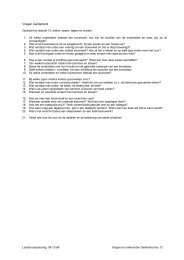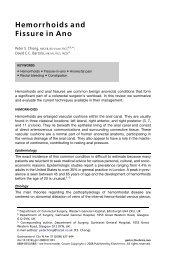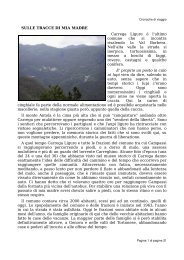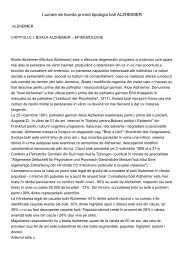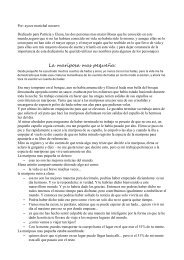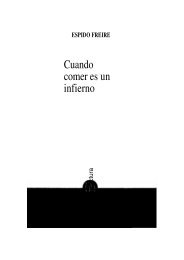Other People's Wars: A Review of Overseas Terrorism in ... - Edocr
Other People's Wars: A Review of Overseas Terrorism in ... - Edocr
Other People's Wars: A Review of Overseas Terrorism in ... - Edocr
Create successful ePaper yourself
Turn your PDF publications into a flip-book with our unique Google optimized e-Paper software.
<strong>Other</strong> Peoples’ <strong>Wars</strong> – Chapter One<br />
more bloody-m<strong>in</strong>ded, with m<strong>in</strong>dsets that divide the world <strong>in</strong>to the<br />
enlightened/dest<strong>in</strong>ed-for-salvation “us,” and the unenlightened/disposable “them”.<br />
Aum Sh<strong>in</strong>ri Kyo, Timothy McVeigh, and al Qaeda respectively saw the general<br />
population <strong>of</strong> the Western world as doomed, hopelessly compromised or as the<br />
enemy itself.<br />
9. Expanded target lists: The essence <strong>of</strong> terrorism <strong>in</strong>cludes its seem<strong>in</strong>g randomness<br />
and talent for search<strong>in</strong>g out weakness. The Provisional W<strong>in</strong>g <strong>of</strong> the IRA<br />
considered “legitimate military targets” to <strong>in</strong>clude soldiers on leave <strong>in</strong> Europe; the<br />
wives and children <strong>of</strong> soldiers; ceremonial parades where tourists are present; a<br />
Remembrance Day Ceremony; and recruit<strong>in</strong>g booths at trade fairs. Lat<strong>in</strong><br />
American death squads <strong>in</strong> countries that had been bedeviled by guerrillas have<br />
seldom bothered to hunt armed <strong>in</strong>surgents <strong>in</strong> the jungle when there were – for<br />
example – unarmed union organizers, schoolteachers, nuns, peasants, or irritat<strong>in</strong>g<br />
journalists to murder. The Islamic Fundamentalists tend to be even less<br />
discrim<strong>in</strong>at<strong>in</strong>g.<br />
10. Assured Indentity: Modern terrorist groups tend to establish a clear modus<br />
operandi that precludes the need to send communiqués. Older groups used to<br />
send letters to the media to describe why they had committed their actions,<br />
plac<strong>in</strong>g their deeds <strong>in</strong> an ideological framework while usually blam<strong>in</strong>g the<br />
authorities or the target for the terrorists’ actions, and to seek publicity. Modern<br />
groups <strong>of</strong>ten do not bother because the manner <strong>of</strong> their actions and selection <strong>of</strong><br />
targets speaks for itself. Moreover, many <strong>of</strong> them have no wish to communicate<br />
with their target at all. However, <strong>in</strong> some cases, an <strong>in</strong>surgent group may be<br />
compet<strong>in</strong>g for <strong>in</strong>fluence and prestige <strong>in</strong> another audience altogether. For<br />
example, sundry Palest<strong>in</strong>ian groups might not bother to send a communiqué to the<br />
Israelis after committ<strong>in</strong>g an attack, except that status and <strong>in</strong>fluence <strong>in</strong>side much <strong>of</strong><br />
the Palest<strong>in</strong>ian community depends on a demonstrated ability to harm the Israelis,<br />
and it is vitally important to claim credit for an attack to this audience.<br />
Except for a few highly specialized s<strong>in</strong>gle <strong>in</strong>terest groups (such as the Animal<br />
Liberation Front and related “ecotage” groups) virtually all modern terrorists have<br />
become <strong>in</strong>ternational <strong>in</strong> scope and far more dangerous than the progenitor groups <strong>of</strong> the<br />
late 1960s and ‘70s. They are tougher, more resilient, less likely to be easily confronted,<br />
and far more likely to push roots deep <strong>in</strong>to the broader community <strong>of</strong> their cultural<br />
compatriots. There is no easy way to deal with them.<br />
The Marxist and quasi-Marxist m<strong>in</strong>dsets that dom<strong>in</strong>ated the terrorists <strong>of</strong> the 1960s and<br />
‘70s <strong>in</strong>volved a revolutionary endgame <strong>in</strong> which the terrorists could both provoke a civil<br />
war, and then w<strong>in</strong> it. They saw the authorities <strong>of</strong> their own nations as the government<br />
they sought to supplant, and – wherever they grew large enough – sought to create<br />
alternate <strong>in</strong>stitutions to rival those <strong>of</strong> the government – e.g. people’s courts and schools.<br />
While most contemporary groups are usually (but not always) much less <strong>in</strong>terested <strong>in</strong><br />
the annoyances <strong>of</strong> provid<strong>in</strong>g responsible government, they still must sometimes provide<br />
<strong>in</strong>stitutions <strong>of</strong> their own with<strong>in</strong> the community they wish to lead. Hizbollah and Hamas,<br />
for example, provide schools, orphanages, and hospitals <strong>in</strong> Lebanon and the Palest<strong>in</strong>ian<br />
community. <strong>Other</strong> groups claim to provide such benefits – refugee relief and<br />
16







